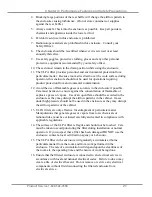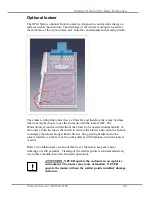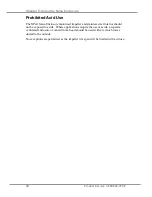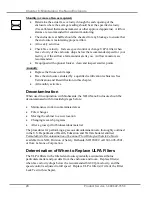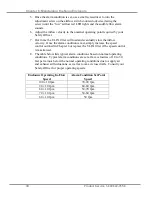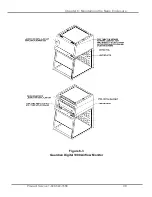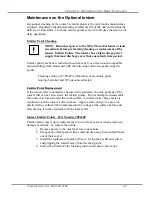
Chapter 6: Maintaining the Nano Enclosure
Product Service 1-800-522-7658
28
Monthly (or more often as required)
Determine the actual face velocity through the sash opening of the
enclosure where the average reading should be at the specified velocity.
(Use calibrated thermal anemometer or other approved apparatus). Airflow
alarms are recommended for constant monitoring.
The enclosure rear baffle should be checked for any blockage to ensure that
the enclosure is maintaining proper airflow.
All weekly activities.
Check face velocity. Increase speed control or change ULPA filter when
face velocity of the enclosure drops below the recommended speed for your
facility or if the airflow alarm monitor alerts you. Airflow monitors are
recommended.
If equipped with optional Ionizer, clean and inspect emitter points.
Annually
Replace the fluorescent lamps.
Have the enclosure validated by a qualified certification technician. See
Certification and Recertification in this chapter.
All monthly activities.
Decontamination
When used in conjunction with biohazards, the XPert Nano Enclosure should be
decontaminated with formaldehyde gas before:
Maintenance work in contaminated areas
Filter changes
Moving the cabinet to a new location
Changing research programs
After a gross spill of biohazardous material
The procedures for performing a gaseous decontamination are thoroughly outlined
in the U.S. Department of Health, Education and Welfare booklet entitled
Formaldehyde Decontamination of Laminar Flow Biological Safety Cabinets
,
available from NIH, Division of Safety, Bethesda, MD 20892, call 301-496-2801,
or from Labconco Corporation.
Determination of When to Replace ULPA Filters
The ULPA filters in the filtered enclosures gradually accumulate airborne
particulate matter and powders from the enclosure and room. Replace filter(s)
when face velocity drops below the recommended 60-80 fpm velocity, and the
speed control is adjusted to full speed. Replace ULPA filter(s) if it fails the Filter
Leak Test in this chapter.








